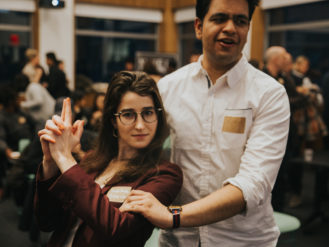5 Tech Ventures to Make Our Cities Smarter and Safer
At a Downtown Brooklyn pitch contest, startups tout their solutions. The winner: Bixby, a system for better living in apartments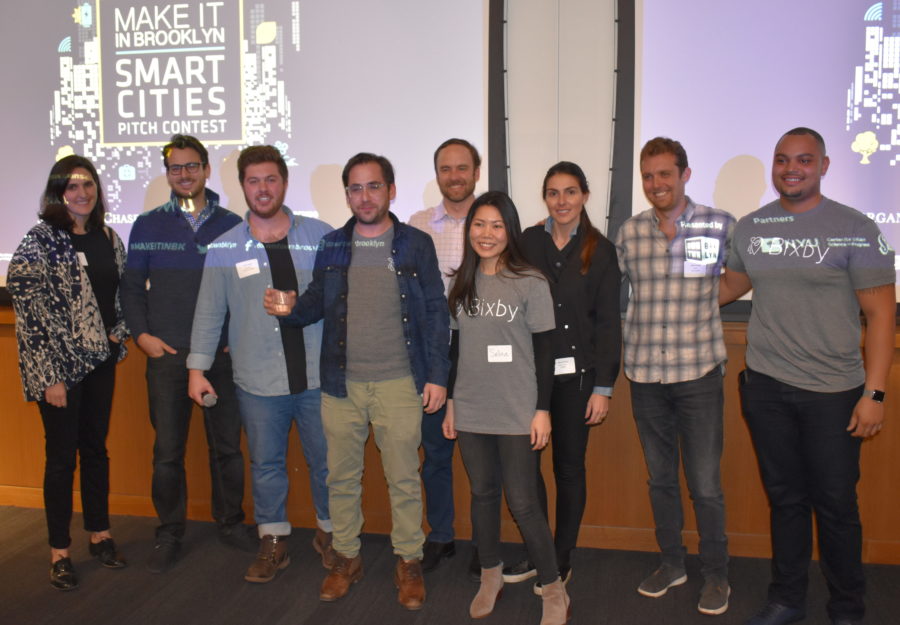
The judges, emcee and reps from Bixby, the winning team (Photos by Steve Koepp)
We may have smartphones in our pockets, but the cities around us are still pretty dumb, with sluggish mass transit and inefficient old buildings. Fixing that problem with “smart cities” technology was the focus of the Downtown Brooklyn Partnership’s latest pitch contest. Five start-up companies, the finalists among more than 50 who applied, touted their ventures last night in front of a panel of expert judges at NYU’s Center for Urban Science and Progress (CUSP) at the school’s newly renovated building at 370 Jay St.
After five energetic pitches, the winner as Bixby, a property-management platform that enables landlords to deliver services to their residents. The judges said they chose Bixby after “taking into consideration the maturity of the business, the local market of Brooklyn, the viability of the model, and the promise of the technology,” announced Tyler Woods, the emcee for the event and lead reporter for Technical.ly Brooklyn. The winning company took home a check for $5,000, thanks to sponsor JPMorgan Chase, as well as in-kind legal services from the Brooklyn Law Incubator and Policy Clinic.
Bixby’s rivals pitched technology to run self-driving vehicles, organize car pools for kids, turn food waste into energy, and provide real-time information to emergency workers. Snapshots of the five pitches:
1. Bixby: a platform for delivering services to apartment dwellers
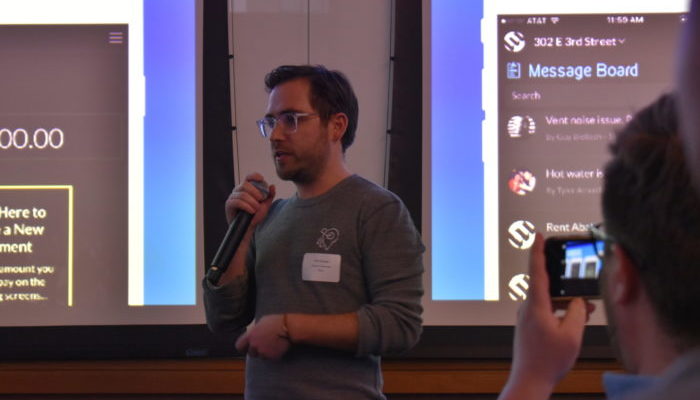
Bixby, launched in 2006, calls itself “an easy-to-use web & mobile app that combines all your resident-relations activities into one place.” That could apply to paying rent and making repairs, but Bixby is also intended as a full-service provider of amenities, said Eric Kramer (above), the company’s director of partnerships, who called real estate “the world’s largest industry” and yet “an antiquated business.” Kramer said the company would have three revenue streams: platform fees from building managers, transaction fees from residents, and affiliate commissions paid by service vendors. The company has $500,000 in financing committed toward a pre-seed round, and is aiming for $1 million in revenue in the next 12 months. Asked by a judge how the company will ensure quality services, Kramer said he tries them all himself. “I’ve had plenty of massages,” he said.
2. Carmera: gathering intelligence for self-driving vehicles
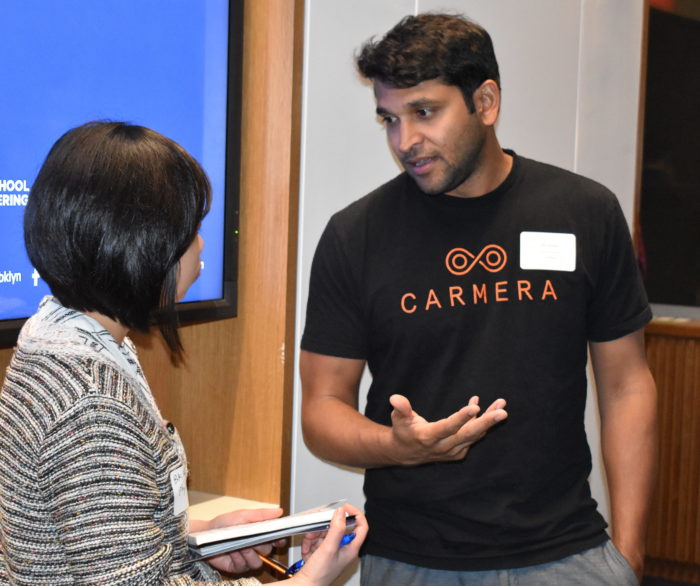
Carmera says its mission is to provide “street-level intelligence for autonomy,” meaning smarter self-driving vehicles. With autonomous cars still in the experimental stage, and the perils of roving robots becoming clear, Carmera CEO Ro Gupta (above) made a compelling case for providing autonomous vehicles with a greater amount of information about their surroundings. Current mapping technology is insufficient because it becomes obsolete quickly, he said. “It’s very difficult for an autonomous vehicle to see something for the first time.” Carmera aims to provide vehicles with a continuously updated stream of 3-D data from “an owned and professionally crowdsourced vehicular sensor network.” The Dumbo-based company has raised more than $7 million in funding and recently opened an office in Seattle.
3. GoKid: a carpool-organizing tool for transporting kids
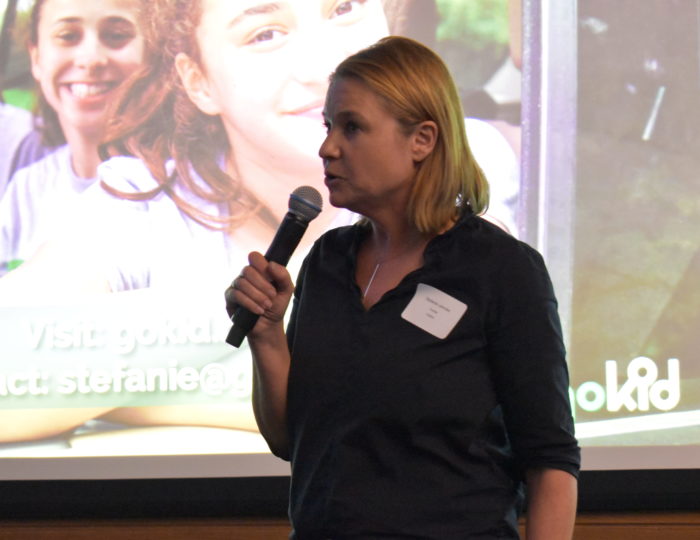
The problem: getting kids to school and activities when mass transit doesn’t work. In New York City alone, more than 300,000 students are driven to school every day, said Stefanie Lemcke (above), founder of GoKid, which calls itself “a complete, mobile-friendly carpool solution.” Lemcke was careful to make clear that “we are not an Uber for kids,” but a networking service for trusted fellow parents. GoKid licenses the technology to schools (typical annual fee: $10,000) to offer to parents, who can use the system to find other parents with similar transportation needs on a map. GoKid is growing rapidly, Lemcke said, with more than 100,000 rides scheduled so far. The startup is also in talks with Jaguar Land Rover about building the technology into its cars.
4. Hylas: turning food waste into energy
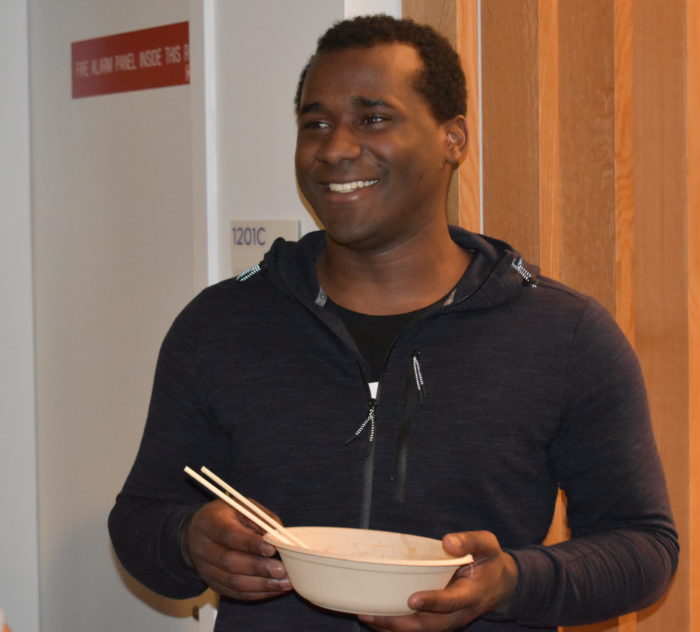
“More people are paying attention to food waste,” said Hylas CEO Shamir Hyman (above), which is an appropriate concern, since most food waste winds up in landfills. There, the food decomposes and forms bio-gas, which escapes into the atmosphere and contributes to climate change. The amount of annual food waste amounts to about 400 lbs. per person, the company says. Instead, the surplus food could be turned into bio-gas at home, producing energy for the homeowner. Hylas, which operates out of New Lab at the Brooklyn Navy Yard and recently won a $10,000 grant, is developing an in-home kitchen appliance to manage the process and store the gas. Farther down the line, Hyman said, the more efficient process would be to turn the food waste directly into electricity.
5. N-Gems: providing real-time information to first responders
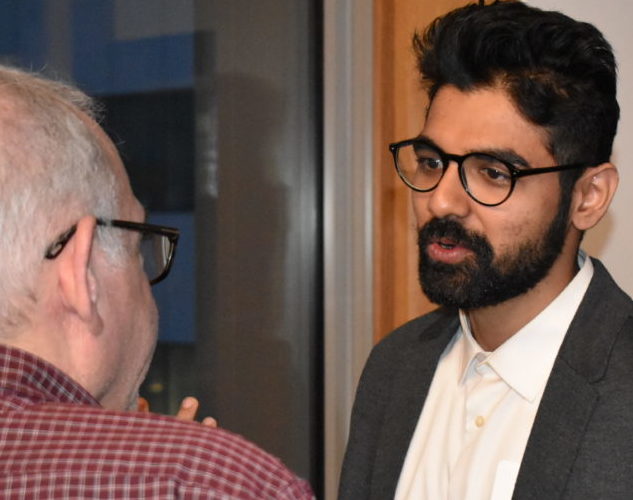
N-Gems, which stands for Next Generation Emergency Managements Systems, aims to provide real-time information to rescue crews in disaster situations. Chetan Hasabnis (above), the founder and CEO, calls the platform “a black box for buildings.” Hasabnis, who formed the venture with a group of fellow NYU graduates, said his passion for the project is based partly on personal experience: “I lost someone close … to a disaster.” The goal of N-Gems is to provide real-time situational awareness to the first responders even before they arrive on the scene to hunt for people who need to be rescued. The system’s network includes information from installed emergency detectors, modules to pick up signals from people’s wireless devices and digitized floor plans, showing the possible location of disaster victims in a visual format. While more established tech companies already provide some of the parts in this chain, N-Gems would link them all together, said Hasabnis. The company’s motto: “Know where your people are when knowing matters the most.”
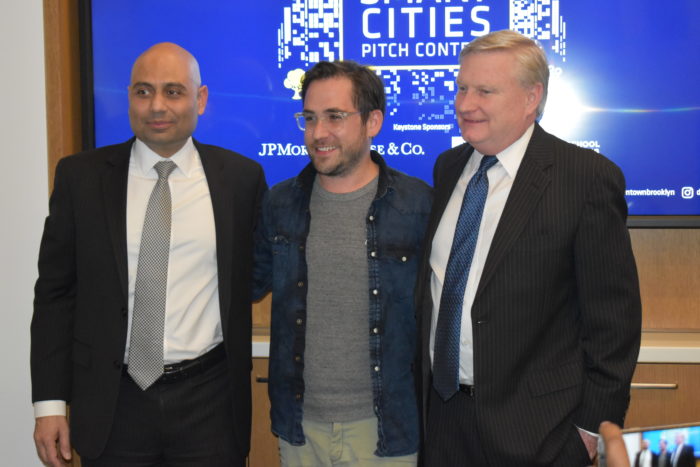
The winner, Eric Kramer of Bixby (center), with reps from sponsor JPMorgan Chase: Syed Rizvi, vice president, and Christopher Murtha, market executive/executive director
The five judges for the contest: Shaina Horowitz, director of the Urban Tech Hub at New Lab; David Post, global enterprise public-sector leader for IBM; Miriam Roure, program director at Urban-X; Joe Silver, program manager for Urban Future Lab at the NYU Tandon School of Engineering; and Jacob Yormak, partner at Story Ventures.





